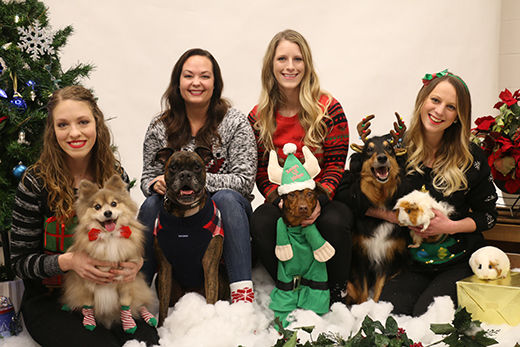It’s the time of year for holiday parties and large family gatherings, but while you might be looking forward to your favorite holiday dish or traditions, a Kansas State University veterinarian says some of them are dangerous to pets.
Susan Nelson, clinical professor at the university’s Veterinary Health Center, shares tips that could help you keep your pet from harm.
• Don’t add stress. If your dog isn’t much of a people person, an increase in parties and guests coming and going for the holidays can make them nervous or stressed. The best place for your pet is in a back room away from guests, Nelson said. You may need to speak with your veterinarian about anti-anxiety medications if your pet is extremely anxious this time of year.
• Remember as well that it is easy for a pet to slip through an open door when greeting a guest, and an escaped pet could become a lost pet. "This time of year there is a higher potential for pets to get lost if there is snow on the ground," Nelson said. "Snow covers familiar scents, making it hard for them to find their way home. Make sure your pet is also properly identified with a collar and tags and/or a microchip in case of an escape."
• Don’t share food or drinks. You might be planning to indulge in some sweet treats and special meals at holiday parties, but there are some foods that should be off limits for your pet. "Alcohol, caffeinated beverages, yeast dough, and fatty, rich foods should be out of reach for pets," Nelson said. "Fatty foods, especially for dogs, can cause pancreatitis, which can be life-threatening. Bones also should not be offered as they can cause obstruction and perforation of the gastrointestinal tract."
• Other toxic treats to keep out of reach: chocolates; macadamia nuts; raisins; grapes; dips containing garlic, chives or onion; drinks and confections made with nutmeg; salty snacks; and sugar-free candies that contain xylitol. And don’t forget to keep trash cans closed and food wrappers out of reach, as they are too tempting for pets to get into and ingest.
"Remember to have guests put purses out of reach so your pets don’t get into sugar-free gum, cigarettes or medications," Nelson said.
• Avoid a decoration disaster. Keep an eye on your pets around potentially hazardous decorations. Tinsel and ribbons, which are very tempting for cats, can be dangerous if ingested and can cause bunching up of the intestines, which can be fatal. Glass ornaments can break and cut pets’ feet, and hooks used to hang ornaments can become problems in the gastrointestinal tract if swallowed. Be aware of any candles you have out, so pets don’t knock them over and get burned or start a house fire. Light cords need to be out of reach for animals to prevent electrocution if chewed on, Nelson said.
"It is important to keep liquid potpourri out of reach as it can be toxic for your pet if ingested," Nelson said.
• Reconsider decorating with your favorite holiday plants. "People often forget about seasonal plants and pets," Nelson said. "Holly and mistletoe are toxic if ingested, and all parts of lilies are toxic for cats. While not deadly, poinsettias can cause vomiting and diarrhea. Also, don’t allow pets to drink the water from the base of live Christmas trees as water additives and chemicals from the tree can cause gastrointestinal distress and possibly death."
• Don’t forget about gifts for the pets. "Giving gifts to the pets can be fun, but remember to keep food items hidden until the last minute," Nelson said. "Also keep food items that are gifts for your family out of reach so pets don’t tear open packages. Your pet’s exceptional sense of smell makes these items irresistible."
After the presents are opened, keep an eye out for dangerous toy pieces such as small parts or balls. "These items can become foreign bodies if ingested, and batteries—especially if punctured from chewing—can cause burns in the mouth and gastrointestinal tract," Nelson said.
• Start the New Year off right. Dogs with noise phobias will be frightened during New Year’s Eve parties—especially when it comes to poppers, noisemakers and fireworks. Additionally, cats will be attracted to string confetti, which if ingested, can cause a gastrointestinal obstruction.
Nelson recommends keeping pets in a room where they are protected from loud noises, and talking with your veterinarian about medications for noise phobias, should your pet suffer from severe noise anxiety. The use of string confetti should be avoided, or if used, removed before your cat is allowed in the area.

